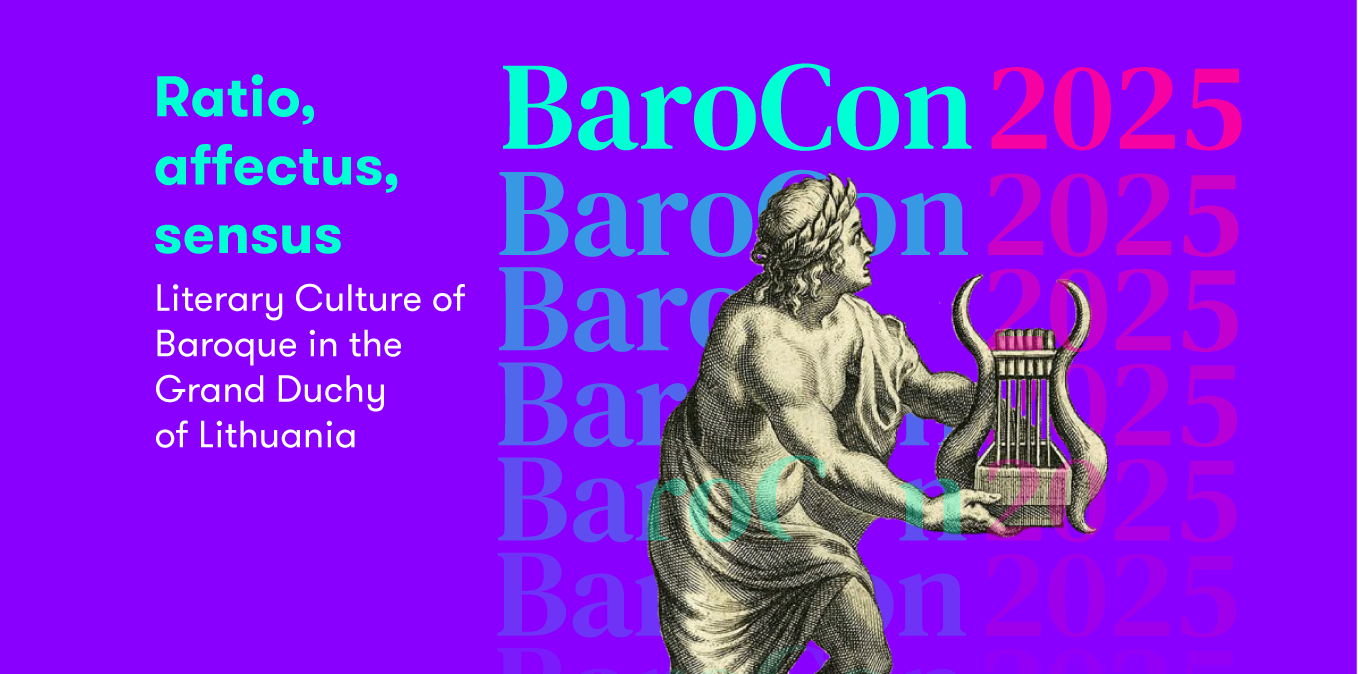Ratio, affectus, sensus: Literary Culture of the Baroque in the Grand Duchy of Lithuania
In 2025, we will commemorate the 400th anniversary of the first publication of Matheus Casimirus Sarbievius' most famous Latin poetry collection 'Lyricorum libri tres' (1625). This has led to 2025 being declared the Year of Baroque Literature in Lithuania. The eminent Jesuit neo-Latin poet of the Polish-Lithuanian Commonwealth, Sarbievius, has been hailed as the Christian Horace and the Sarmatian Horace. His theoretical thoughts on poetry and rhetoric are still highly regarded and have inspired new research on other concurrent themes and authors. This anniversary provides an opportunity to explore the extent and diversity of Baroque literary culture, which has seen a surge of interest in recent decades, both in the academic world and in popular culture. Therefore, the Institute of Lithuanian Literature and Folklore, together with the Faculty of Philology of Vilnius University, is organising an international academic conference "Ratio, affectus, sensus: Literary Culture of the Baroque in the Grand Duchy of Lithuania" on 25-27 September 2025 in the baroque city of Vilnius.
The aim of the multidisciplinary conference is to stimulate discussion on the literary culture of the "long seventeenth century" (from the end of the 16th century to the middle of the 18th century) in the Grand Duchy of Lithuania. This historical period, associated with dramatic changes and a general cultural crisis, is often described in contradictory terms and in constant tension between reason and senses, rigid structure and passions, classifications and impressions, etc. By embracing this contradiction, we invite an exploration of the theme in question through the lens of this dynamic interplay between reason (ratio), emotion (affectus) and the senses (sensus), which can be perceived in various genres of the period, such as poetry, biography, hagiography, rhetoric, private and public correspondence, and so on. The importance of the modern approach lies not only in what it can reveal about the Baroque in the Grand Duchy of Lithuania, but also about subsequent and contemporary literary culture, as scholars have demonstrated the continuing influence of a 'Baroque spirit'.
Event location
25–26 September the conference will take place at V. Krėvė (118) auditorium, Faculty of Philology
27 September the conference will take place at the Church Heritage Museum, Šv. Mykolo g. 9 (entrance from Maironio g. "Arkangelo konferencijų centras")
Keynote speakers

Ona Dilytė-Čiurinskienė
Senior Researcher, The Institute of Lithuanian Literature and Folklore
Prof Stephen Harrison
Professor of Latin literature, University of Oxford
Krzysztof Fordoński
An Ode 'with Large Additions': Isaac Watts 'Translates from Casimire’s Book IV Ode 4'
Krzysztof Fordoński
Uniwersytet Warszawski
An Ode 'with Large Additions': Isaac Watts Translates from Casimire’s Book IV Ode 4
Keywords: Sarbiewski, Isaac Watts, translation, emulation, translation of poetry
The celebrated English hymnographer Isaac Watts (1674-1748) first encountered the poetry of Maciej Kazimierz Sarbiewski during his elementary education at Southampton. The fascination with an exotic Polish and, which is far more striking when we think of the devout Protestant Watts, Roman Catholic Jesuit poet continued for a large part of Watts’ life. The practical effect of the fascination are thirteen surviving translations. Watts found Sarbiewski so inspiring that he adapted one of his odes as a hymn intended for his congregation although, apparently aware that Jesuit poetry could raise many Puritan eyebrows, he did not reveal the original author in the publication. Usually, however, he made the connection clear and he expressed his admiration for Sarbiewski in the preface to his collection of poems Horae Lyricae. The present paper deals with the most striking and free of the thirteen translations – “The celebrated Victory of the Poles, over Osman the Turkish Emperor, in the Dacian battle Translated from Casimire. Book IV. Ode 4. with large Additions”. Watts first published the translation in 1706 edition of Horae Lyricae but he kept on returning to the poem, expanding the translation (or perhaps emulation) almost with every one of the seven editions of the collection published in his lifetime. Ultimately, the poem which in the original consists of 92 lines grew to 227 lines. The paper shall briefly present Isaac Watts, probably the most influential of English translators of Sarbiewski in the first half of the 18th century. It will then attempt to place Watts’ translation strategies within the context of translation practice of the Augustan Age. Ultimately, it will offer an analysis of the “large additions”, alterations introduced in the original text by the English poet.


